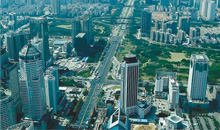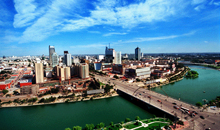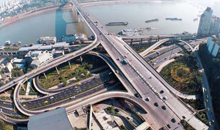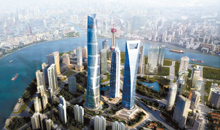(Editor: Leona)
It's all about getting a piece of the roaring action from the world's most populous country and largest market. In 2014, US states and cities had China on their minds, WILLIAM HENNELLY reports from New York.
Something about doing business with China that makes American states and even cities act like their own countries.
Some states, such as California and Texas, which have gross state products larger than most nations' GDPs, regularly send their top officials to all corners of the Chinese mainland in search of commerce.


The states' efforts are naturally supported by the US government, as the Commerce Department recently concluded the 25th US-China Joint Commission on Commerce and Trade (JCCT) talks in Chicago.
Governors Rick Perry of Texas and Rick Snyder of Michigan have made several trips to China. Snyder has been there four times, and last month was in Guangzhou and Shenyang urging Chinese companies to set up shop in Michigan. Perry toured Beijing and Tianjin in September and had visited Shanghai four years prior.
Mayors get in on the act, too. Los Angeles's Eric Garcetti visited Beijing in November; Chicago's Rahm Emanuel was in China in 2013. Next month, Minneapolis' Betsy Hodges will travel to "City of Ice" Harbin for advice on increasing cold-weather tourism in her city.
China's kind of town, Chicago is
Chicago's landing the JCCT was a coup for an event that usually occurs in Washington. US Commerce Secretary Penny Pritzker, a Chicago native, and US Trade Representative Michael Froman hosted the Chinese government delegation, and for the first time, the JCCT schedule included events to facilitate private sector engagement.
"We had the opportunity to hear from our respective private sectors," Pritzker said Dec 18 on a press conference call. Pritzker said the two nations made progress on medical and pharmaceutical issues, and agreed to work together to combat illegal fishing and on the fair enforcement of China's anti-monopoly laws.
Thirty years ago, said Pritzker, US-China trade amounted to less than $5 billion. Today, it totals $617 billion. She said that 7.3 million Chinese are expected to travel to the US by 2021 under a new extended-visa policy, amounting to $8.5 billion per year for the economy and up to 440,000 jobs.
Pritzker and US Secretary of Energy Ernest Moniz will lead a mission to China next April to focus on industries supporting smart cities and smart growth, a visit Pritzker described as a "super trade mission to China".
Chicago is using some of its industrial muscle to compete with the great port cities in California, Texas and Washington state. China is Chicago's second-largest trading partner after Canada.
In December, Chinese real estate giant Dalian Wanda Group announced it would invest $900 million in a riverfront residential and hotel tower in Chicago.
When Emanuel visited China, he signed a gateway cities agreement with China's Ministry of Commerce that established sister-city relationships with Beijing, Shanghai, Tianjin, Qingdao, Shenyang, Hangzhou, Wuhan and Chengdu; those cities sent representatives to JCCT.
"Increasing opportunities for trade between Chicago businesses and their Chinese counterparts is critical to the continued growth of our city's economy," Emanuel told the Chicago Tribune.
"China is now our state's largest trading partner and the destination for more than one-fifth of Washington state exports," Kristi Heim, executive director of the Washington State China Relations Council, wrote in an e-mail to China Daily. "The value of Washington exports to China was $16.7 billion last year, nearly double the value of exports to the next largest market, Canada.
"One reason why exports continue to climb is that Washington has a great diversity of products that appeal to China's growing middle class, from airplanes to medical devices to seafood and fruit," said Heim. "E-commerce is now helping smaller companies find markets in China. Washington farmers sold tons of cherries to Chinese consumers earlier this year through online commerce sites in China and charter flights from Seattle to Shanghai."
Washington state in sweet spot
Heim said the "cherry charters" helped farmers find new markets for perishable fruit.
"We have seen great interest from Alibaba in expanding here," she said. "The company recently opened an office in downtown Seattle and plans to expand its engineering staff. Managers from Alibaba's Tmall have visited Seattle a number of times, and we've helped introduce them to local companies. They held a special promotion for Washington state featuring our governor, Jay Inslee, and brands such as Starbucks and Costco, Almond Roca and Washington wines and pears."
Costco has been selling its products in China on Tmall Global since October.
"Investment deals from China have mostly involved real estate, transportation and construction, but technology is an area where we expect to see growing interest and more deals in the next year," Heim said. "Education is also very popular, with new schools and education companies starting up here."
One project that has attracted Chinese investors is a waterfront development and 350-room hotel on Lake Washington, next to the Boeing factory in Renton. Another large project involves an investment by Shanghai Bi Ke Clean Energy Technology Co andDalian Xizhong Island Petrochemical Park.
The state is the largest exporter of all commodities to China of any US state. The top export products include civilian aircraft (Boeing's Commercial Airplanes division in Renton, Washington) and fruits, vegetables and grains, such as soybeans, wheat, apples, corn and potatoes.
Texas means business
"You may see that the future of the United States is the California model or the Texas model," James Chen, Asia-Pacific regional director for the Texas governor's office of Economic Development and Tourism, told China Daily, in reference to how states are approaching commerce. "Our major competitor is California. We are even doing better than New York now."
"Oil, gas, definitely here," Chen said of what the state offers Chinese companies. "High tech, maybe SiliconValley, and definitely Austin."
"We try to help with a site search," Chen said. "Most small to mid-sized companies benefit more from our help. They don't have a structured BD (business development) division."
"I receive an e-mail sometimes from the Guangzhou consulate referring companies that are interested in Texas," Chen said. "If a US company would like to go there, we share with them the contact to the Consulate General office in Houston."
Energy companies CNOOC, CNPC, PetroChina and Sinopec USA all do business in Texas.Telecommunications giant Huawei Technologies has its US headquarters in Plano.
Representatives of the China International Contractors Association, associated with China's Ministry of Commerce, visited Houston in November, for a meeting with the Greater Houston Partnership. The group represents 20 China State-owned enterprises, and Chen said they will return next year.
In 2013, with $10.8 billion in exports, China was Texas' fourth-largest export destination. The state's major exports are industrial and electric machinery, chemicals, plastics and mineral fuel.
Texas imported $42.8 billion worth of Chinese goods, making China second among the state's trading partners. The top imports include electric and industrial machinery, furniture, toys and iron or steel products. Chinese companies have spent $22.2 billion to acquire Texas companies in the last decade.




























 沪公网安备31010402003309号
沪公网安备31010402003309号